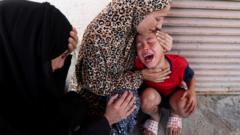Nina Kutina and her two daughters were found living in a cave in India, igniting a debate over their lifestyle choice and leading to legal scrutiny regarding their immigration status. Kutina’s claims of happiness amidst nature contrast starkly with concerns surrounding the safety of their living conditions and her legal standing in India.
Russian Mother and Daughters Rescued from Cave in Karnataka, India: A Story of Survival or Misunderstanding?

Russian Mother and Daughters Rescued from Cave in Karnataka, India: A Story of Survival or Misunderstanding?
The unusual case of a Russian mother and her children living in a cave in Karnataka has raised questions about their circumstances and future.
Karnataka police are investigating the peculiar situation of a Russian woman and her two daughters discovered living in a cave in the southern state of India. Nina Kutina, 40, was rescued on July 9 during a routine patrol by local authorities in the Gokarna forest near the popular tourist destination of Goa. Her daughters, ages six and five, were also found with her, and all three lack valid immigration documents to remain in the country.
Kutina has defended her unconventional lifestyle in interviews with the Indian news agency ANI, claiming she and her children enjoyed living in nature and benefitted from its healthful properties. However, authorities remain puzzled about how long the family has been residing in the cave, the circumstances that led them there, and the legality of their stay in India.
Police spokesperson M Narayana indicated that the area, favored by foreign tourists, poses dangers such as snakes and potential landslides, prompting increased patrols to safeguard visitors. The officers stumbled upon the cave after noticing brightly colored fabrics drying outside; upon further exploration, they encountered the couple inside, who were living amidst rudimentary supplies such as plastic mats and basic groceries.
Kutina has disclosed that she was originally from Russia but ceased residing there over 15 years ago. Throughout her travels, she claims to have visited numerous countries, including Costa Rica and Thailand, and provided insight into her family's tumultuous past marked by loss, noting the death of her eldest son in a road accident in Goa.
As officials investigate, they have identified the father of the two young girls as Israeli businessman Dror Goldstein, who has voiced concern over the children's wellbeing and has been advocating for joint custody. He reported filing a missing persons complaint when Kutina left Goa without notice.
The timeline of Kutina's journey to Karnataka remains unclear, with inconsistencies regarding her time in Goa and the nature of her living arrangements. Although she informed police of her intention to meditate and seek spiritual growth in the cave, she has resisted categorizing their living situation as spiritually motivated.
Despite Kutina's assertion that her daughters were thriving and enjoying their time in the wilderness, the authorities emphasize their safety. After their rescue, all three were taken for medical evaluations and deemed fit, but upon being placed in a detention center for foreigners, Kutina criticized the conditions, comparing them unfavorably to their cave.
As the investigation continues and arrangements for their repatriation are finalized, the story of Kutina and her daughters raises essential questions regarding immigration policies, personal autonomy, and the fragile boundaries between survival, lifestyle choices, and legal implications.



















